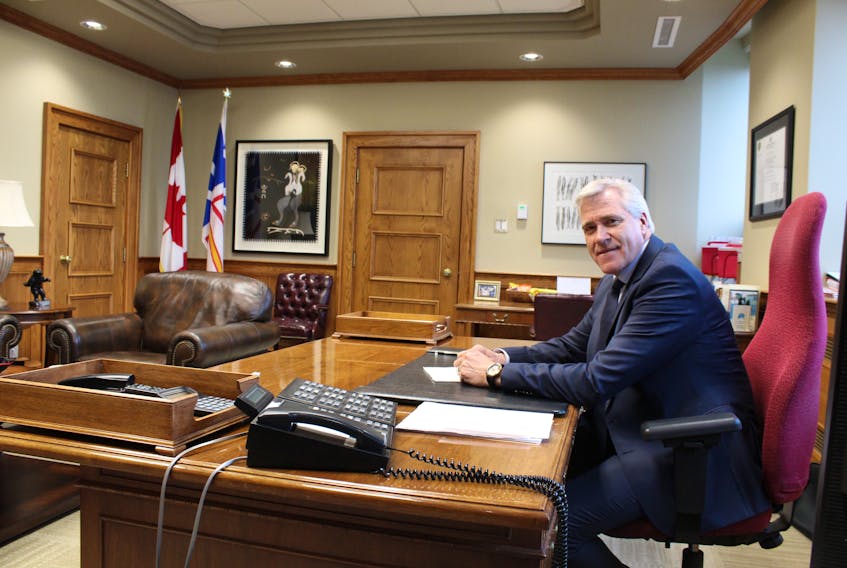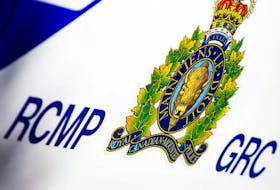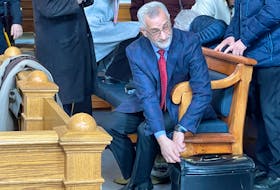ST. JOHN'S, N.L. — Premier Dwight Ball says he knows who he has to work with to keep a fragile minority government from collapsing from underneath him.
“Everyone,” Ball said Thursday in an interview with The Telegram.
“I think the message has been loud and clear for the people of the province. We’ll be working with the two independents, the NDP and the PC party. Everyone has agreed to work together.”
Newfoundland and Labrador is the fourth minority government in the country, and the third in Atlantic Canada, where New Brunswick and Prince Edward Island also have minority governments.
Ball says he is not looking to form a coalition with any other parties to help secure a voting majority.
“Right now, it’s really down to what the House looks like when we get back in there,” he said.
“There have been no discussions on a formal coalition with any group or party.”
Next comes the question of the Speaker. With 20 Liberal MHAs on one side, and a 20-seat opposition on the other side, the margin is razor tight. Should the Speaker be elected from the Liberals, the governing party will be down to 19 votes. The Speaker, by default, supports the “status quo,” meaning he or she would vote to support the government in the event of a tie vote. But a Liberal Speaker would still give the Liberals 20 votes. A tie vote is considered a loss.

Ball says he intends to leave it up to MHAs to choose the Speaker.
“The intent is to take a Speaker from the floor of the House of Assembly. It’s not a discussion I’ve had with the people of my caucus to this point, but I would expect there would be interest on the Liberal side,” said Ball.
“Who knows, there may be interest on the PC side or the NDP or the independents, although I think they’ve said publicly that they’re not interested in that role. But, we’ll see.”
In British Columbia, the NDP minority government is kept in line by Speaker Darryl Plecas, who was elected as a Liberal, but became an independent after accepting the position. Ball points to that example as one case where the Speaker came from across the political aisle.
The only two elections for Speaker in the province’s history took place under Ball’s leadership, when Scott Reid challenged Tom Osborne for the role in 2016, and Pam Parsons challenged Perry Trimper in 2017.
Then, there’s cabinet.
Anyone can be made a cabinet minister, if the premier requests it. Judy Manning was appointed Justice minister in 2014 without even being elected, for example.
But Ball says having independent cabinet ministers or ministers from other parties is “not really” something he’s considering right now.
“Obviously, you think of all those things, you think what that could look like. Then, there’s dynamics that would have to occur, where that person sits in the House of Assembly. You have to be prepared to sit on the government side to take questions,” he said.
“It’s happened before, but it’s not something that I’m entertaining right now.”
A delay in this process is that ballots from Torngat Mountains and Cartwright-L’Anse au Clair are waiting to be shipped from Labrador to be included in the official count by Elections Newfoundland and Labrador. Ball says the ballots could make their way to the island by Friday, which could allow the official count to be released. Once the count is released, 12 clear days are needed before the legislature can be recalled.
That means there are 12 days to swear in all members, appoint a cabinet and get ready to work on passing the 2019 provincial budget.
On Wednesday, the official call for a judicial recount was issued by Elections Newfoundland and Labrador for the district of Labrador West. The call for a recount was automatic, given a less-than-10 vote margin of victory. NDPer Jordan Brown defeated Liberal Graham Letto by five votes.
“When you think about it, we were literally less than 80 votes away from three seats. Once again, it reminds us the importance that every vote does count,” said Ball.
"... we were literally less than 80 votes away from three seats. Once again, it reminds us the importance that every vote does count." — Dwight Ball
Once a judge is appointed for the recount, four days will pass to allow both sides to prepare. It’s likely a judge will be appointed soon, so the expectation is that the recount will take place next week.
Elections Newfoundland and Labrador says there were 26 rejected ballots in the Labrador West race. If the judge decides to admit some or all of the ballots, the election could be overturned, sending the NDP down to two members, and handing the Liberals a majority government, once again.
Ball says the party is not going to call for a recount in Bonavista, but will likely ask for a recount in Stephenville-Port au Port, where PC Tony Wakeham defeated Liberal John Finn by 31 votes.
Ball says June 5 is the earliest date he sees to recall the legislature.
Ball says he thinks the 2019 provincial budget can be passed before the end of June, even with negotiations and debate to get through.
Ball says he stands by how he decided to roll out the budget, followed by dropping the writ of election.
There is no “perfect path” to how the budget and election campaign are rolled out, he says.
“You could have had the budget approved, and people would say, ‘you didn’t give us a chance to reject it,’ or whatever. Then an incoming party would have been left with a difficult situation, coming in in June if there was a change in government,” Ball said.
“Then we would have had no budget. That budget would have been defeated and we would have been in a situation that we haven’t been into. It would have been uncharted waters. The budget will be there now, and all parties will get an opportunity to vote on it, based on the feedback they’ve been given during the election.”
Twitter: @DavidMaherNL
RELATED









